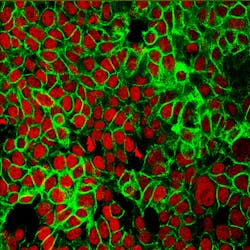In a new article published in the July issue of Cancer Research, researchers at Moffitt Cancer Center in Tampa, FL, discovered a key protein that oscillates its expression through microRNA regulation to facilitate cancer spread to distant organs.
This protein is ∆Np63, a member of the p53 family of tumor suppressor genes.
The overarching goal of lead researcher Elsa Flores, PhD, and her team is to develop therapies for p53 mutant cancers. P53 is difficult to target therapeutically because of its wide range of important cellular functions. This work from the Flores lab expands on previous research focused on the p53 family and its role in inhibiting tumor development and growth.
ΔNp63 regulates the epithelial to mesenchymal (EMT) process, which in cancer can allow cells to lose contact with surrounding tumor cells, enter the bloodstream and spread to other areas of the body. This protein is overexpressed in many primary tumors and metastases. The Flores lab showed that ∆Np63 must be silenced for the cancer cells to undergo EMT and enter the bloodstream to spread.
To better understand the ∆Np63 protein expression and its role in cancer metastasis, the Flores lab developed mouse models to modulate ΔNp63 expression during breast cancer metastasis. They found that oscillatory, or periodic, expression of the protein is required for efficient metastasis. They also discovered a network of four microRNAs, regulated by TGFβ, that can target and silence ΔNp63 expression.
“This finding is important because it gives us better insight into the regulation of ΔNp63 and TGFβ, key players in the metastatic process,” said Flores, chair of the Department of Molecular Oncology and leader of the Cancer Biology and Evolution Program at Moffitt. “P53 is commonly mutated in human cancers, and we have found that ∆Np63 and p53 interact extensively in cancer. We can use this information to design personalized therapies for cancer patients with alterations in the p53/p63 pathways.”
The Flores lab is developing microRNA-based therapies to keep proteins like ∆Np63 expressed at appropriate levels in the proper context in a growing cancer to block metastatic spread.

